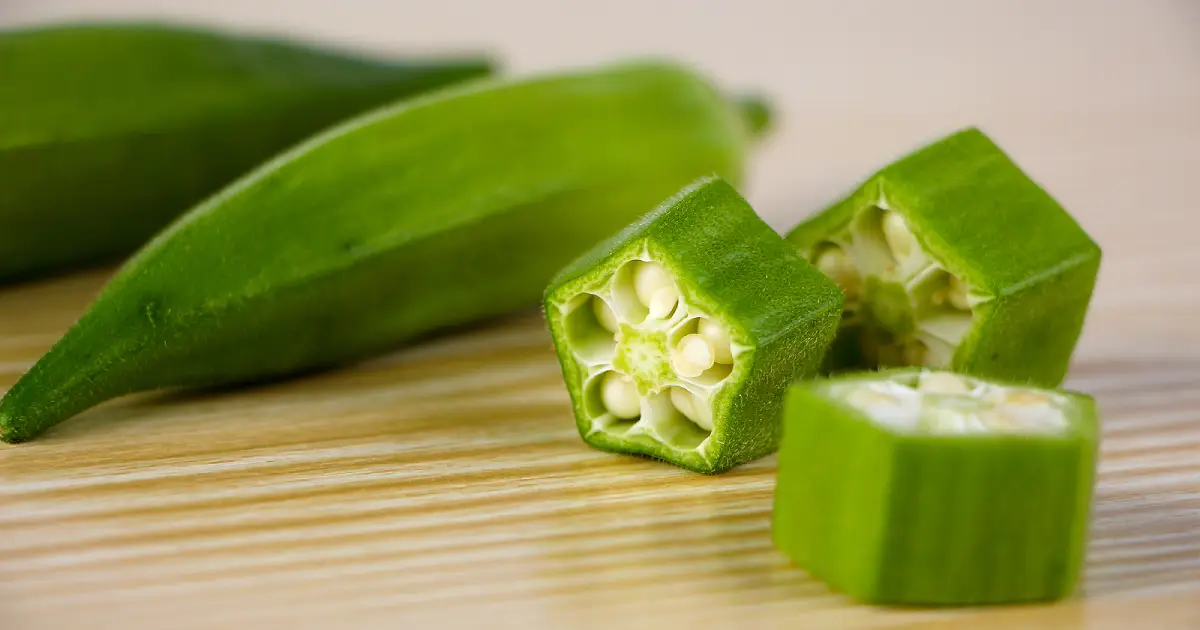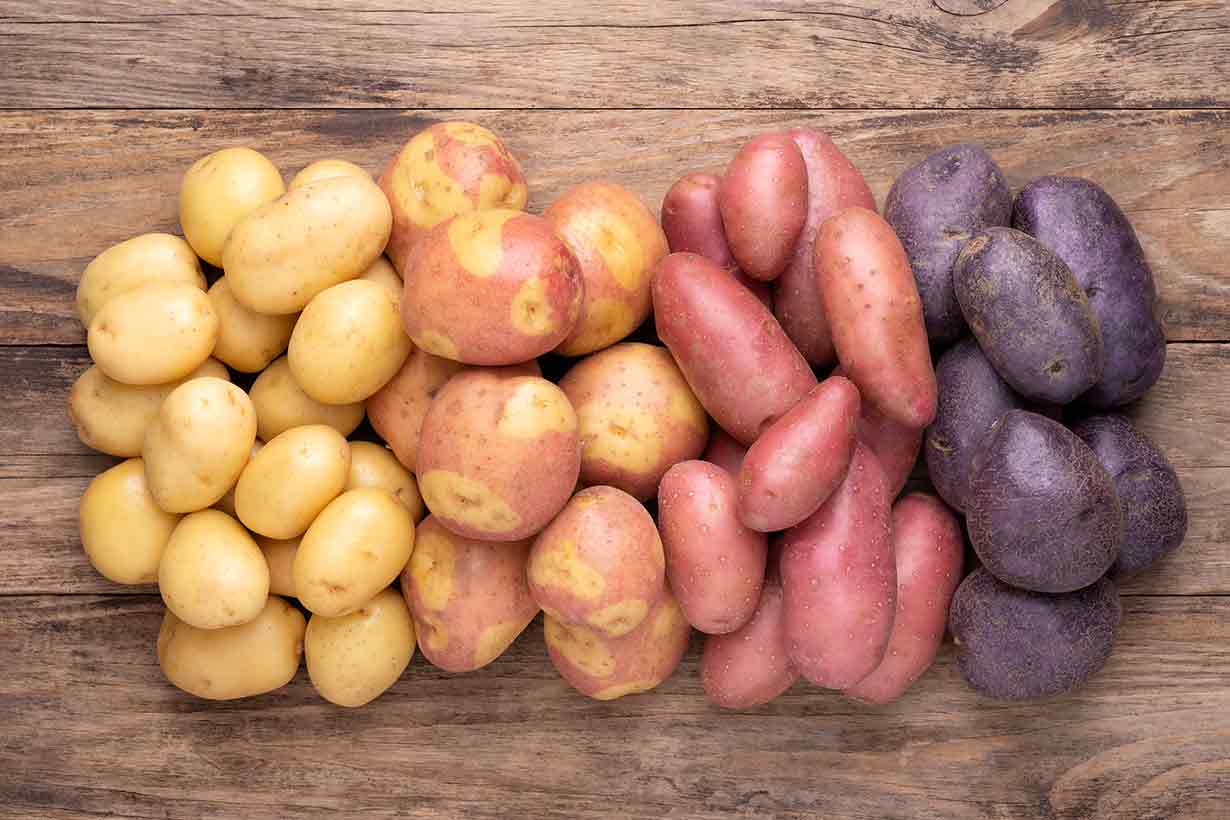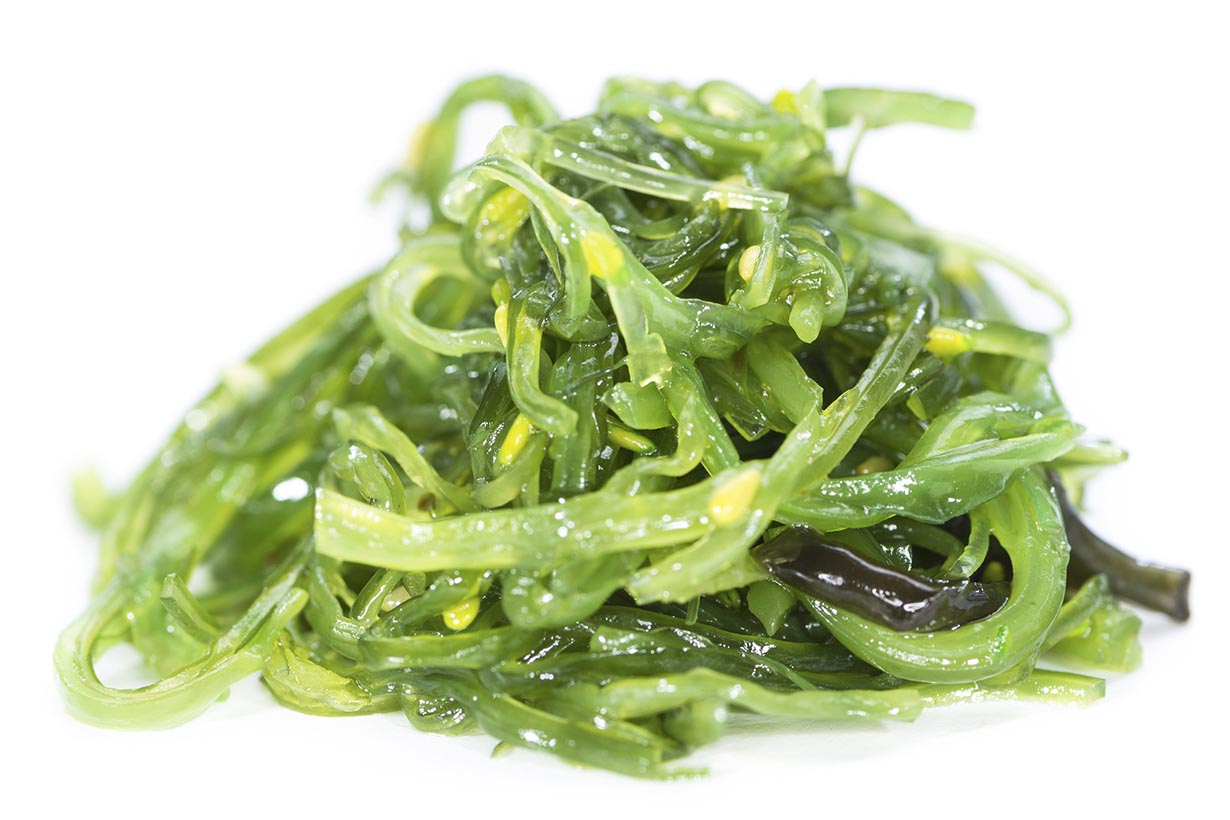Okra is a fruit known scientifically as Abelmoschus esculentus that is commonly eaten as a vegetable. It provides notable amounts of fiber, manganese, and vitamins C and K.
Recent scientific studies have suggested okra may have health benefits related to blood sugar control and cardiovascular health.
This article examines the research, objectively assesses okra’s potential health benefits, and presents okra’s full nutrition facts.
Table of contents
Potential Health Benefits

Most of the scientific research focuses on okra’s potential for improving blood sugar regulation and lipid (cholesterol) profiles.
Okra May Help Improve Cardiovascular Health
Elevated levels of “bad” LDL cholesterol (LDL-C) are thought to play a causal role in the development of cardiovascular disease.
However, recent scientific research indicates that okra may help lower LDL-C levels:
- A 2025 systematic review of 12 randomized controlled trials found that okra supplementation significantly lowered LDL-C levels. It also lowered blood pressure and body mass index (BMI). Dosages ranged from 125 mg to 40,000 mg.
- A 2024 systematic review of 9 randomized controlled trials found that, based on “high quality” evidence, okra supplementation significantly reduced LDL-C and fasting blood glucose, among other cardiovascular markers. These effects were seen at daily doses as low as under 3,000 mg (3g) per day.
- A different 2024 systematic review of 8 randomized controlled trials concluded that the evidence wasn’t strong enough to conclude okra reduced LDL-C levels. However, this review included fewer studies (3 compared to 5) that specifically focused on LDL-C data, so it wasn’t as strong to evaluate this effect.
The sticky type of soluble fiber okra contains, known as “mucilage,” may help support this LDL-C-lowering effect.
This is because mucilage can bind bile acids and remove them from the body. The liver requires cholesterol to produce bile acids, so it must pull cholesterol from the blood to replace lost bile acids.
Interventions that can lower LDL-C are widely acknowledged as reducing cardiovascular risk, and okra may provide benefit in this regard.
Understanding How Okra “Supplementation,” Okra Powder, and Fresh Okra Relate
It’s important to note that many studies on okra use powdered okra supplements rather than whole, fresh okra.
Nutritional composition data shows that powdered okra flour has 7–10% moisture, whereas raw, whole okra is 90% water. Based on this, this suggests that 10 grams of powdered okra is approximately equivalent to 100 grams of whole okra.
Okra May Support Lower Blood Sugar Levels
Over recent years, numerous studies have investigated the effect of okra intake on blood sugar levels.
Here is a summary of the findings from recent studies:
- A 2025 systematic review of 6 randomized controlled trials found that okra supplementation significantly reduced fasting blood sugar. It also had a significant impact on lowering HbA1c, which is a three-month average snapshot of blood sugar levels.
- A 2023 systematic review of clinical studies on okra intake in individuals with prediabetes or type 2 diabetes had similar findings. This review found that okra significantly reduced fasting blood glucose. However, the effect on HbA1c levels was less clear, with no significant differences between the okra group and the control group.
- A previous systematic review published in 2022 found that supplementation with okra extracts improved blood sugar control in animal studies.
Based on the existing evidence from human trials, okra appears to have a beneficial impact on fasting blood sugar, with mixed evidence for its effect on long-term HbA1c.
Can Okra Lower Inflammation Levels?
Inflammation is a necessary process that helps the body heal from injury and recover from illnesses. However, chronic inflammation—which places the body in a constant state of stress—has been linked to chronic diseases such as type 2 diabetes and cardiovascular disease.
Notably, a 2022 systematic review looked into this topic, examining the effect of okra on inflammatory markers. While the review did not find (or include) clinical human trials, it assessed the evidence from cell (test tube) and animal studies.
Based on data from 26 studies, this review found that there was a “downward trend” in inflammatory markers after okra treatment. These markers included C-reactive protein (CRP) and interleukin-6 (IL6), among others.
It is possible that bioactive compounds in okra, such as flavonoid polyphenols, may be responsible for this effect.
In this regard, research has shown that okra is a rich source of quercetin, a flavonoid with anti-inflammatory properties.
While there is a lack of human clinical trials, preclinical studies suggest that okra—and the compounds it contains—may have anti-inflammatory properties.
Okra is a Rich Source of Beneficial Nutrients
Per 100 grams of cooked okra, it provides:
- More than 30% of the daily value for vitamin K
- Over 10% of the daily value for vitamin C, thiamin, vitamin B6, folate, copper, and manganese.
These nutrients play diverse roles in the body, contributing to everything from immune processes to supporting healthy pregnancies.
Other vitamin K options: Asparagus is also an excellent source of vitamin K.
Potential Drawbacks
For the vast majority of people, okra is a beneficial addition to the diet.
However, as with all foods, it is important to be aware of context-specific drawbacks that may impact some individuals.
Okra Isn’t Suitable For Low-Oxalate Diets
Okra is relatively high in oxalate (oxalic acid), with approximately 56mg oxalate per half-cup serving of boiled okra.
Oxalate is a natural compound found in many plant-based foods. When oxalate combines with calcium in the kidneys, it can form calcium oxalate stones, more simply known as kidney stones.
For this reason, people prone to calcium oxalate kidney stones are often advised to follow low-oxalate diets.
Organizations such as Urology San Antonio and the Oxalosis and Hyperoxaluria Foundation consider okra to be a moderate–high oxalate food
Individuals who have been prescribed a low-oxalate diet may wish to discuss okra with their healthcare provider.
In short, okra is a healthful dietary choice, but its oxalate levels may limit its consumption for individuals following low-oxalate diets.
Okra’s Vitamin K Content (and Interaction Considerations For Anticoagulants)
Okra is high in vitamin K, a beneficial essential nutrient. However, individuals using anticoagulants (blood thinners) such as warfarin may wish to consult with their healthcare provider if adding it to their diet.
This is because vitamin K—which has procoagulant properties—may potentially interact with these medications. For this reason, a stable and consistent vitamin K intake may be important for ensuring prescribed anticoagulant dosages are correct.
Interactions Between Okra and Anti-diabetic Drugs
Some concerns have been raised about potential interactions between okra and the diabetes drug metformin. This followed a 2011 study in rats, concluding that the viscous fiber present in okra reduced metformin absorption.
However, no human research has confirmed this negative effect.
Furthermore, a recent 2023 randomized controlled trial involving 100 patients with type 2 diabetes investigated the impact of 1000 mg of powdered okra, three times daily alongside standard antidiabetic therapy (which included metformin).
The study showed that okra supplementation used alongside standard therapy significantly decreased fasting blood sugar, HbA1c, and cholesterol compared to placebo (standard therapy alone).
In summary, while a study in rats indicated that okra may interact with metformin, human trials haven’t repeated this finding. The latest human trial showed that okra supplementation alongside standard antidiabetic therapy improved blood sugar levels.
As always, anyone with concerns about interactions should discuss the issue with their healthcare provider.
Full Nutritional Profile
Now that we have looked at the potential benefits and drawbacks of okra, let’s examine all the different nutrients it provides.
The following tables present the full nutritional values for cooked okra per 100g and per half-cup (80g) serving.
Nutritional data is sourced from the USDA percent daily values (% DV) are based on a typical 2000-calorie diet.
Calories and Macronutrients
| Nutrient | Per 100g | Per 80g half-cup |
|---|---|---|
| Calories | 22 kcal | 18 kcal |
| Carbohydrates | 4.51g (2% DV) | 3.61g (1% DV) |
| Fiber | 2.5g (9% DV) | 2.0g (7% DV) |
| Sugars | 2.4g | 1.92g |
| Fat | 0.21g (<1% DV) | 0.17g (<1% DV) |
| Saturated fat | 0.05g (<1% DV) | 0.04g (<1% DV) |
| Monounsaturated fat | 0.03g | 0.02g |
| Polyunsaturated fat | 0.05g | 0.04g |
| Omega-3 | <0.01g | <0.01g |
| Omega-6 | 0.05g | 0.04g |
| Protein | 1.87g (4% DV) | 1.5g (3% DV) |
| Cholesterol | 0 mg (0% DV) | 0 mg (0% DV) |
As the table indicates, okra is low in calories, and also has modest carbohydrate levels. It is not a significant source of fat or protein.
While okra provides a notable amount of fiber at 2.5 grams per 100g, it isn’t among the vegetables with the highest fiber content. If you’re looking for vegetables with the most fiber, see this list of 21 Vegetables High in Fiber.
Vitamins
| Vitamin | Per 100g | Per 80g half-cup |
|---|---|---|
| Vitamin A (RAE) | 14 mcg (2% DV) | 11.2 mcg (1% DV) |
| Vitamin C | 16.3 mg (18% DV) | 13 mg (14% DV) |
| Vitamin D | 0 mcg (0% DV) | 0 mcg (0% DV) |
| Vitamin E | 0.27 mg (2% DV) | 0.22 mg (1% DV) |
| Vitamin K | 40 mcg (33% DV) | 32 mcg (27% DV) |
| Thiamin (B1) | 0.13 mg (11% DV) | 0.11 mg (9% DV) |
| Riboflavin (B2) | 0.06 mg (5% DV) | 0.04 mg (3% DV) |
| Niacin (B3) | 0.87 mg (5% DV) | 0.70 mg (4% DV) |
| Pantothenic acid (B5) | 0.21 mg (4% DV) | 0.17 mg (3% DV) |
| Vitamin B6 | 0.19 mg (11% DV) | 0.15 mg (9% DV) |
| Folate (B9) | 46 mcg (12% DV) | 36.8 mcg (9% DV) |
| Vitamin B12 | 0 mcg (0% DV) | 0 mcg (0% DV) |
| Choline | 8.7 mg (2% DV) | 6.96 mg (1% DV) |
Minerals
| Mineral | Per 100g | Per 80g half-cup |
|---|---|---|
| Calcium | 77 mg (6% DV) | 61.6 mg (5% DV) |
| Iron | 0.28 mg (2% DV) | 0.22 mg (1% DV) |
| Magnesium | 36 mg (9% DV) | 28.8 mg (7% DV) |
| Phosphorus | 32 mg (3% DV) | 25.6 mg (2% DV) |
| Potassium | 135 mg (3% DV) | 108 mg (2% DV) |
| Sodium | 6 mg (<1% DV) | 4.8 mg (<1% DV) |
| Zinc | 0.43 mg (4% DV) | 0.34 mg (3% DV) |
| Copper | 0.09 mg (10% DV) | 0.07 mg (8% DV) |
| Manganese | 0.29 mg (13% DV) | 0.24 mg (10% DV) |
| Selenium | 0.4 mcg (1% DV) | 0.32 mcg (1% DV) |
Is Okra a Healthy Choice?
For most people, okra is a nutrient-rich choice and a healthful dietary addition.
Okra is low in calories, rich in several essential nutrients, and scientific research suggests it may support cardiovascular health and blood sugar regulation.
References
Full List of Scientific References
(Click to Expand)
All citations used within this article are listed below, with full details for each scientific source.
- Jan Boren et al. (2020). Low-density Lipoproteins Cause Atheroscletoric Cardiovascular Disease: Pathophysiological, Genetic, and Therapeutic Insights: A Consensus Statement from the European Atherosclerosis Society Consensus Panel. Source link
- Ali Jafari et al. (2025). Beneficial Effects of Okra Consumption on Anthropometric Measures, Blood Pressure, Glycaemic Control, Lipid Profile, and Liver Function Tests in Randomized Controlled Trials: a GRADE-assessed Systematic Review and Dose-Response Meta-Analysis. Source link
- Hossein Bahari et al. (2024). The Cardiometabolic Benefits of Okra-based Treatment in Prediabetes and Diabetes: A Systematic Review and Meta-Analysis of Randomized Controlled Trials. Source link
- Xiaolei Zhang et al. (2024). The Effects of Okra Consumption on Glycaemic Parameters and Lipid Profile in Adults: A Systematic Review and Meta-Analysis. Source link
- Omar Mhaimeed et al. (2024). The Importance of LDL-C Lowering in Atherosclerotic Cardiovascular Disease Prevention: Lower for Longer is Better. Source link
- Jemima Ofori et al. (2020). Physiochemical and Functional Properties of Dried Okra (Abelmoschus esculentus L.) Seed Flour. Source link
- USDA. (n.d.). Okra, raw. Source link
- Ying Fan et al. (2025). The Impact of Okra (Abelmoschus esculentus) Supplementation on Diabetes and Obesity Biomarkers in Type 2 Diabetes Patients: A Systematic Review and Meta-Analysis of Randomized Controlled Trials. Source link
- Kabelo Mokgalaboni et al. (2023). Okra Ameliorates Hyperglycaemia in Pre-Diabetic and Type 2 Diabetic Patients: A Systematic Review and Meta-Analysis of the Clinical Evidence. Source link
- Aiane Benevide Sereno et al. (2022). Effects of Okra (Abelmoschus esculentus (L.) Moench) on Glycemic Markers in Animal Models of Diabetes: A Systematic Review. Source link
- Theresa V. Rohm et al. (2022). Inflammation in Obesity, Diabetes, and Related Disorders. Source link
- Aida Malek Mahdavi et al. (2022). Effects of Okra (Abelmoschus esculentus L) on Inflammatory Mediators: A Systematic Review of Preclinical Studies. Source link
- Abd Elmoneim O Elkhalifa et al. (2021). Okra (Abelmoschus Esculentus) As a Potential Dietary Medicine With Nutraceutical Importance for Sustainable Health Applications. Source link
- Diwakar Aggarwal et al. (2025). Anti-Inflammatory Potential of Quercetin: From Chemistry and Mechanistic Insight to Nanoformulations. Source link
- Abel Ang et al. (2018). Vitamin C and Immune Cell Function in Inflammation and Cancer. Source link
- NIH. (n.d.). Folate: Fact Sheet For Professionals. Source link
- Oxalosis and Hyperoxaluria Foundation. (2024). Oxalate Food Levels Resource. Source link
- Masao Tsujihata et al. (2008). Mechanism of Calcium Oxalate Renal Stone Formation and Renal Tubular Cell Injury. Source link
- Urology San Antonio. (n.d.). Low Oxalate Diet. Source link
- Violi, Francesco et al. (2016). Interaction Between Dietary Vitamin K Intake and Anticoagulation by Vitamin K Antagonists: Is It Really True? A Systematic Review. Source link
- Hajera Khatun et al. (2011). Water-soluble Fraction of Abelmoschus esculentus L Interacts With Glucose and Metformin Hydrochloride and Alters Their Absorption Kinetics after Coadministration in Rats. Source link
- Mahdi Tavakolizadeh et al. (2023). Clinical Efficacy and Safety of Okra (Abelmoschus esculentus (L.) Moench) in Type 2 Diabetic Patients: A Randomized, Double-Blind, Placebo-Controlled, Clinical Trial Source link
- USDA. (n.d.). Okra, Cooked, Boiled, Drained, Without Salt. Source link







